The sinkings
St Romanus
The St Romanus sailed from Hull on 10 January 1968 and the last firm contact with the vessel was a radio telephone call the same evening. However, despite a company policy that ships should report their position and catch details daily, the alarm was not raised until 26 January, after a number of failed attempts by the owners to contact the ship by radio. It was then discovered that a liferaft found on 13 January by another vessel had come from the St Romanus. A search began, but by 30 January the families were told that there was little hope for the vessel and her crew of 20. [2] Later, at the official enquiry, it was stated that a mayday call from the ship had been heard on 11 January by another ship, but had not been passed on. [3]
Kingston Peridot
The Kingston Peridot had also sailed from Hull on 10 January with a crew of 20, and by 26 January she was fishing off north-east Iceland in foul weather. She told another trawler by radio that she was having difficulties with ice build-up on the ship, and arranged to move east to join them, but no further contact was established and on 29 January one of her liferafts was washed ashore. This, with debris found subsequently, indicated that the vessel had sunk on 27 January. News of her loss was received in Hull on 30 January, just as hope was fading for the crew of St. Romanus. [4]
Ross Cleveland
Ross Cleveland sailed on 20 January, before the loss of the first two trawlers became known. She was bound for the north coast of Iceland with a full crew, but one man, Colin Ireland, was put ashore for medical treatment, leaving 19 on board. Conditions were very poor and on 3 February, following a weather warning, she made for Grænahlíð, [5] a narrow and relatively sheltered inlet on Iceland's north-west coast. A number of other ships were there to wait out what became a long and exceptionally severe storm, with hurricane-force winds and blizzards, causing dangerous amounts of ice to form on the vessels' superstructure and radar. The Ross Cleveland's captain attempted to move her from a dangerous position to a safer one during the evening of 4 February, but the ship was overwhelmed by the wind and sea, capsized and sank. The last radio message received by the other ships was from the captain, and ran:
I am going over. We are laying over. Help me. I am going over. Give my love and the crew's love to the wives and families.
—
Phil Gay, skipper of the Ross Cleveland [6]
Other ships attempted to assist the Ross Cleveland but were defeated by the storm, and two more vessels, the Notts. County and the Heiðrún II, were wrecked in Ísafjörður that night, the latter lost with all hands. News of the sinking reached Hull on 5 February, six days after that of the Kingston Peridot. At first it was believed all aboard Ross Cleveland had died, but on 6 February Harry Eddom, the mate, was discovered alive, having been washed ashore in a liferaft the previous day. Two other men had been with him in the raft, but both had died of exposure before reaching the shore. [7]

The Dogger Bank incident occurred on the night of 21/22 October 1904, when the Baltic Fleet of the Imperial Russian Navy mistook a British trawler fleet from Kingston upon Hull in the Dogger Bank area of the North Sea for Imperial Japanese Navy torpedo boats and fired on them. Russian warships also fired on each other in the chaos of the melée. Two British fishermen died, six more were injured, one fishing vessel was sunk, and five more boats were damaged. On the Russian side, one sailor and a Russian Orthodox priest aboard the cruiser Aurora caught in the crossfire were killed. "Damage to the Aurora was concealed...and only discovered by the deciphering of a wireless message intercepted at [the British] Felixstowe station. It was also considered highly significant that no officer from that ship appeared before the Commission, nor were her logs produced." The incident almost led to war between the British Empire and the Russian Empire.

The Arctic Corsair(H320) is a deep-sea trawler, built in 1960, that was converted to a museum ship in 1999. She is temporarily berthed at Alexandra Dock in Kingston upon Hull, England, pending completion of a new permanent location in the city's Museums Quarter. Exhibits and guides aboard the boat tell the story of Hull's deep-sea fishing industry.
The fishing vessel Gaul was a deep sea factory ship based at Hull, United Kingdom. She was launched in December 1971 by Brooke Marine of Lowestoft, entering service during 1972 with the Ranger Fishing company, where she was registered at North Shields as Ranger Castor, SN18. She was renamed when Ranger Fishing was bought by British United Trawlers and re-registered at Hull as Gaul, H243. She sank some time on the night of 8-9 February 1974 in storm conditions in the Barents Sea, north of Norway. No distress signal was received and her loss was not realised until 10 February after she twice failed to report in. An extensive search operation was launched but no trace of the ship was found, apart from a lifebuoy recovered three months later. All thirty-six crew were lost. The president of the British Trawler Federation described the loss of the Gaul as "the worst ever single-trawler tragedy".

Concordia was a steel-hulled barquentine that was built in Poland in 1992 for the West Island College, Montreal, Canada. She served as a sail training ship until she capsized and sank on 17 February 2010.
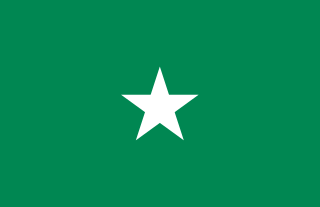
The Ross Group was a British food company founded in Grimsby, England in 1920.
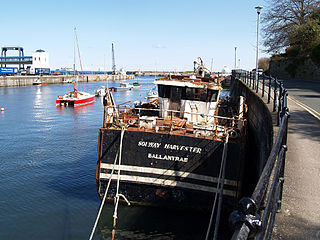
The Solway Harvester was a scallop dredger from Kirkcudbright, Scotland which sank off the coast of Douglas, Isle of Man in heavy seas on 11 January 2000 with the loss of all seven crew members. Following salvage, the damaged ship was taken to Douglas, where she remained until dismantled for scrap in January 2014.

A lifeboat or liferaft is a small, rigid or inflatable boat carried for emergency evacuation in the event of a disaster aboard a ship. Lifeboat drills are required by law on larger commercial ships. Rafts (liferafts) are also used. In the military, a lifeboat may double as a whaleboat, dinghy, or gig. The ship's tenders of cruise ships often double as lifeboats. Recreational sailors usually carry inflatable liferafts, though a few prefer small proactive lifeboats that are harder to sink and can be sailed to safety.
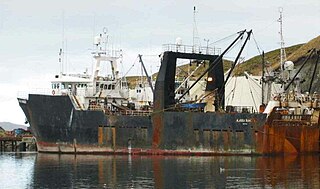
FV Alaska Ranger was a fishing factory ship owned and operated by the Fishing Company of Alaska of Seattle, Washington. The ship was constructed in 1973 for use as an oil field service vessel. The ship sank 23 March 2008, after reporting progressive flooding only hours earlier. Of the 47 on board, 42 were rescued. Of the five fatalities, four were recovered dead, and one was never found. The Coast Guard was initially misinformed about the number of persons on board the vessel, and secured the search with one crew member still unaccounted for. After realizing there was still one person missing, the Coast Guard reinstated the search, but did not find the crew member.
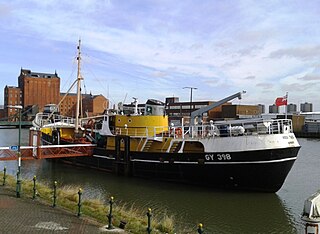
Ross Tiger is a traditional side-winder fishing trawler that was converted into a museum ship in 1992. She is currently berthed in Alexandra Dock at her home port of Grimsby, close to the site of the former PS Lincoln Castle. She forms the star attraction of North East Lincolnshire County Council's National Fishing Heritage Centre since restored and opened to the public in 1992. As Grimsby's last traditional sidewinder 'conventional trawler', she represents a now virtually extinct breed of vessels that once made up the largest fishing fleet in the world.
The Sparta is a 48-metre (157-foot) Russian-flagged fishing trawler and refrigerator ship.

HM Trawler Alvis was a British trawler that was taken up from trade and used by the Royal Navy during the Second World War. She was returned to the fishing industry at the end of hostilities in 1945.
The Russian-flagged fishing trawler Dalniy Vostok sank on 1 April 2015, off Russia's Kamchatka Peninsula in the Sea of Okhotsk. Fifty-seven of the ship's 132 crew members were confirmed dead, with rescue operations underway for survivors. The freezer trawler sank 183 nautical miles west of Krutogorovsky, a settlement in Kamchatka's Sobolevsky District.
On 3 August 1942 the fishing trawler Dureenbee was attacked and badly damaged by Japanese submarine I-175 off the town of Moruya, New South Wales. Three of the trawler's crew were killed, and the ship was subsequently damaged beyond repair after running aground. While the incident has been called a war crime, Allied submarines also conducted similar attacks during World War II.
Lillian Bilocca was a British fisheries worker and campaigner for improved safety in the fishing fleet as leader of the "headscarf revolutionaries" – a group of fishermen's family members. Spurred into action by the Hull triple trawler tragedy of 1968 which claimed 58 lives, she led a direct action campaign to prevent undermanned trawlers from putting to sea and gathered 10,000 signatures for a petition to Harold Wilson's government to strengthen safety legislation. She threatened to picket Wilson's house if he did not take action. Government ministers later implemented all of the measures outlined in the charter.

Mary Denness was a British ship's steward and fisherman's wife. She helped to lead a campaign that led to improvements in the safety of fishing trawlers following the 1968 Hull triple trawler tragedy. Denness afterwards served as a school nurse and was a matron at Eton College.
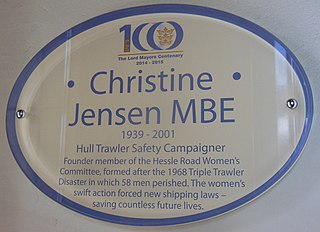
Christine Dorothy Jensen, MBE (1939–2001) was a British safety campaigner. She helped to lead a campaign that led to improvements in the safety of fishing trawlers following the 1968 Hull triple trawler tragedy, in which her brother was killed. Jensen later served on the committee of the British Fishermen's Association and founded a fishing heritage organisation. She was appointed a Member of the Order of the British Empire in 2000.

Yvonne Blenkinsop was a British woman known for her campaign to improve safety in the offshore fishing industry following the 1968 Hull triple trawler tragedy. She became only the third woman in 130 years to be awarded the freedom of the city of Hull in 2018.
The Arctic Viking(H452) was a British trawler ship that sailed from the Port of Hull in the East Riding of Yorkshire, England. Whilst the vessel was originally a commercial fishery ship, she also served as an anti-submarine vessel during the Second World War where she was sunk by enemy action. She was later involved in the Cod Wars, being actually targeted by a vessel from the Icelandic Navy. Besides her wartime service, she had two other accidents; one a collision in 1956 and another where she sank with the loss of five of her crew, 16 miles (26 km) off Flamborough Head in October 1961.

The Yorkshire coast fishery has long been part of the Yorkshire economy for centuries. The 114-mile (183 km) Yorkshire Coast, from the River Tees to the River Humber, has many ports both small and large where the fishing trade thrives. The historic ports at Hull and Whitby are important locations for the landing and processing of fish and shellfish. Scarborough and Bridlington are also sites of commercial fishing.
Harry Eddom is a former English trawlerman. He was the sole survivor of the Hull triple trawler tragedy which claimed the lives of 58 Hull sailors in January and February 1968.













